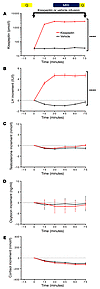Kisspeptin in the limbic system
The hormone kisspeptin is essential for reproductive function, an effect that is mediated by its actions in the hypothalamus. Recent studies suggest that kisspeptin and its receptor are also expressed in other regions of the brain; however, little is known about the effects of this hormone in the brain in regions outside of the hypothalamus. In this episode, Waljit Dhillo and colleagues evaluate limbic system-specific effects of kisspeptin administration in healthy male volunteers. The data from this study indicate that kisspeptin action in the limbic system mediates sexual and emotional brain processing.
Related articles
Citation Information: J Clin Invest. 2017;127(2):709-719. https://doi.org/10.1172/JCI89519.
Abstract
Authors
Alexander N. Comninos, Matthew B. Wall, Lysia Demetriou, Amar J. Shah, Sophie A. Clarke, Shakunthala Narayanaswamy, Alexander Nesbitt, Chioma Izzi-Engbeaya, Julia K. Prague, Ali Abbara, Risheka Ratnasabapathy, Victoria Salem, Gurjinder M. Nijher, Channa N. Jayasena, Mark Tanner, Paul Bassett, Amrish Mehta, Eugenii A. Rabiner, Christoph Hönigsperger, Meire Ribeiro Silva, Ole Kristian Brandtzaeg, Elsa Lundanes, Steven Ray Wilson, Rachel C. Brown, Sarah A. Thomas, Stephen R. Bloom, Waljit S. Dhillo



Copyright © 2025 American Society for Clinical Investigation
ISSN: 0021-9738 (print), 1558-8238 (online)

